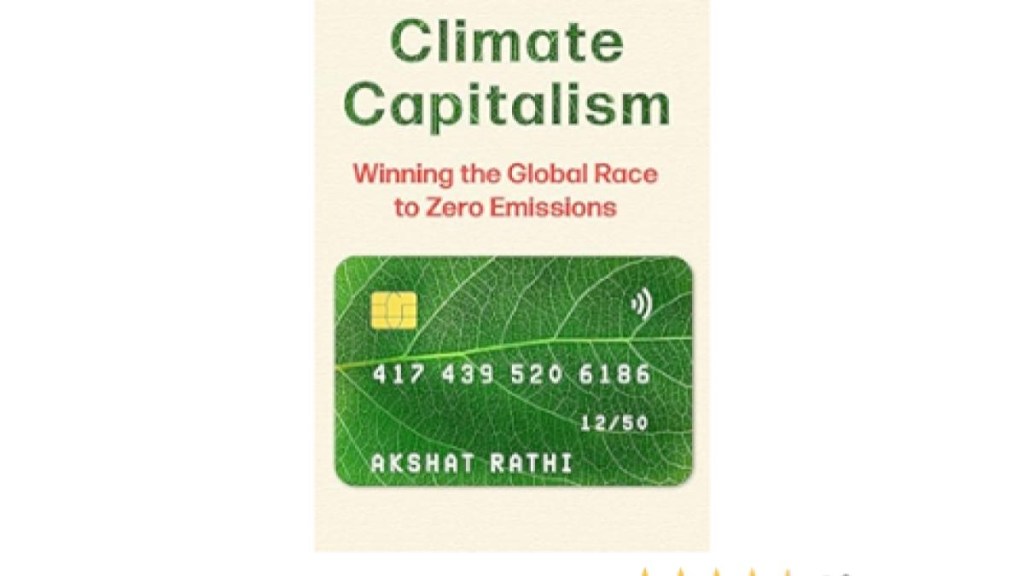By Mohit Hira
There are so many volumes being written on climate change that one often wonders whether the number of trees being felled to churn out the paper for these tomes is a contradiction in itself. And while Hachette doesn’t reassure me that Akshat Rathi’s Climate Capitalism: Winning the Global Race to Zero Emissions is printed on recycled paper, the book itself is worth picking up, reading and returning to. What the publishers have done, however, is deploy a clever design element for its cover—or perhaps it’s the author’s sister, Surabhi, who he acknowledges “for help with the cover”. Either way, a 13-digit number indicates the amount of carbon dioxide in our atmosphere as of October 2023; and that’s a frightening 50% more than pre-industrial levels. One may even question how they measured it back then but there’s no question about the author’s untiring efforts to track down and document individuals—“unlikely heroes”—who are playing a key role in combating climate change.
In an almost contrarian way, Rathi’s work sparks a discussion on the possibility of leveraging capitalism to address the climate crisis. His optimistic outlook and provocative ideas present a nuanced perspective, acknowledging both promise and challenges we face.
Without shying away from it, the author confronts the contradictions within capitalism, recognising its profit-driven nature that is often at odds with the environment, and its reliance on perpetual economic growth on a finite planet. This acknowledgement serves as the very foundation for his central argument: redirecting these forces can serve as instruments for our environmental salvation.
In the course of his journey, Rathi proposes ambitious solutions, advocating for a ‘green industrial revolution’ powered by market incentives through carbon pricing, green subsidies, and a global competition for clean energy. He envisions a restructured financial system prioritising sustainable investments and a flourishing green technology sector driven by venture capital and private-sector innovation.
Despite the resonance of Rathi’s vision, scepticism persists. Critics, such as Ann Pettifor, question the feasibility of aligning profit motives with environmental responsibility. The key concerns revolve around whether corporations, driven by shareholder interests, can genuinely prioritise long-term sustainability over short-term gains and if competitive markets can effectively contribute to collective environmental goals.
Recognising these challenges, Rathi advocates for substantial government intervention, proposing carbon pricing, green infrastructure investments, and regulatory frameworks to guide markets toward sustainable practices. However, concerns arise about potential market distortions and the risk of regulatory capture, where special interests manipulate regulations for personal gain.
Rathi places significant faith in technological advancements, especially carbon capture and storage (CCS), to mitigate climate change effects. However, the unproven scalability and environmental impact of CCS raise uncertainties. Investing heavily in untested technologies, while promising, carries the risk of diverting resources from more established solutions.
The fundamental question posed by Rathi is whether capitalism itself is the ideal tool for addressing the climate crisis. Some argue that its emphasis on growth and profit clashes with the required paradigm shift for true sustainability. Alternative economic models, such as degrowth or doughnut economics, are suggested to prioritise ecological well-being over perpetual expansion.
One of the reasons to pick up the book and navigate it unhurriedly is its collection of people who are battling climate change in myriad ways: from Sumant Sinha of ReNew Power to Wan Gang whose role in the EV industry has been overshadowed by the more flamboyant Elon Musk and Paul Polman of Unilever to Vicki Hollub of Occidental Petroleum… and so many others.
Climate Capitalism serves as a crucial starting point for a necessary conversation. Rathi urges us to recognise the limitations of our current economic model while acknowledging its potential for positive change. Success depends not on blind faith in markets but on our collective ability to regulate their excesses, drive sustainable technological innovation, foster global cooperation, and reassess our approach to consumption and growth.
In conclusion, Climate Capitalism injects optimism into the climate debate but should not be viewed as a guaranteed roadmap. The real challenge lies in steering capitalism towards a sustainable future, recognising it as only one piece of the broader puzzle in the race to zero emissions.
Mohit Hira is co-founder, Myriad Communications & venture partner at YourNest Capital Advisors
Book’s name: Climate Capitalism: Winning the Global Race to Zero Emissions
Author: Akshat Rathi
Publisher: Hachette
Pp 272, Rs 699







